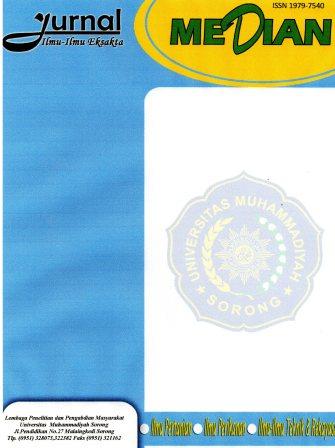Community-Based Mangrove Ecotourism On Jeflio Island, Mayamuk District, Sorong District, Southwest Papua
DOI:
https://doi.org/10.33506/md.v15i3.2759Keywords:
Local wisdom, ecotourism, mangrovesAbstract
The aim of the study was to analyze the value of coastal local wisdom of the indigenous people of Jeflio Island for the development of mangrove ecotourism. In the research method used qualitative and quantitative approaches. Data analysis includes analysis of local wisdom values. Based on research, the Jeflio community has local wisdom in the form of calls for conservation known in the form of recommendations such as "Nani Mi Wawolom Ti Eges Gu" (the native language of the Moi tribe), Pamali (prohibition) in certain areas/areas, Sasi - Customs and ceremonies," barapen" as well as local handicrafts such as making senate/mats, woven bags, "bayayai", boats, oars and spears. Local Wisdom Through Advice “Nani Mi Wawolom Ti Eges Gu” comes from the language of the Moi tribe which means protecting nature together. Local wisdom, such as local skills, traditional ceremonies and local values, is a cultural tourism attraction that can be empowered by tourism managers as creative industries to develop mangrove ecotourism to attract tourists and support local community economic development. One of the improvements in existing facilities in the Jeflio Mangrove Ecotourism Area is a souvenir shop that can be used to sell local Jeflio community crafts. In order to maintain and maintain the infrastructure of the Jeflio Mangrove Ecotourism Area, local wisdom values such as mutual cooperation and togetherness are very much needed. There are still weaknesses in the use of local wisdom in Jeflio because local wisdom owned by the community has not been legitimized.
References
Amfar, F. (2015). Pelaksanaan Tugas Dan Fungsi Panglima Laot Di Kota Sabang. Pascasarjana Universitas Syiah Kuala, 7(4), 13. http://e-repository.unsyiah.ac.id/MIH/article/view/5745
Husamah, H., & Hudha, A. M. (2018). Evaluasi Implementasi Prinsip Ekowisata Berbasis Masyarakat Dalam Pengelolaan Clungup Mangrove Conservation Sumbermanjing Wetan, Malang. Jurnal Pengelolaan Sumberdaya Alam Dan Lingkungan (Journal of Natural Resources and Environmental Management), 8(1), 86–95. https://doi.org/10.29244/jpsl.8.1.86-95
Ketti, N. C. (2020). Peranan kearifan lokal papadak dalam pengelolaan pesisir dan laut di Desa Nggodimeda dan Desa Siomeda, Kecamatan Rote Tengah. JPLB, 2020(2), 513–527. http://www.bkpsl.org/ojswp/index.php/jplbhttp://www.bkpsl.org/ojswp/index.php/jplb
Manurung, M., Yanti, D. I. W., Payung, C. N., & Felia, K. T. Y. (2023). Persepsi Masyarakat Terhadap Ekowisata Mangrove Di Kampung Jeflio Distrik Mayamuk. Median Volume 15 Nomor 1 Bulan Februari 2023. 15, 36–44.
Sugiyarto, S., & Amaruli, R. J. (2018). Pengembangan Pariwisata Berbasis Budaya dan Kearifan Lokal. Jurnal Administrasi Bisnis, 7(1), 45. https://doi.org/10.14710/jab.v7i1.22609
Tambas, J. S., Hidayat, K., Abadi, A. L., & Kepel, C. (2017). Maneke as Local Wisdom in the Community of Small Islands in Sangihe Island Regency, North Sulawesi. Journal of Indonesian Tourism and Development Studies, 5(1), 57–64. https://doi.org/10.21776/ub.jitode.2017.005.01.08
Tebaiy, S., & Manuputty, A. (2017). Kearifan Lokal Suku Kamoro Dalam Pemanfaatan Sumber Daya Perikanan Di Distrik Mimika Timur Jauh Papua. Prosiding Simposium Nasional Ikan Dan Perikanan, 990–998. http://iktiologi-indonesia.org/wp-content/uploads/2019/04/Selvi-Tebay-989-998-resize.pdf
Widyastini, T., & Dharmawan, H. (2013). Efektivitas Awig-Awig Dalam Pengaturan Kehidupan Masyarakat Nelayan Di Pantai. Sodality : Jurnal Sosiologi Pedesaan 01(01), 37–51.
Yanti, D. I. W., Paruntu, C. P., Kepel, R. C., Mandagi, S. V, & Tabalessy, R. R. (2021). Community structure of mangrove in Jeflio Island, Sorong Regency, West Papua, Indonesia (Vol. 14). http://www.bioflux.com.ro/aacl
Yulisti, M., Kurniasari, N., & Yuliaty, C. (2015). Analisis Keberlanjutan Lilifuk: Tinjauan Persepsi Masyarakat Lokal. Jurnal Sosial Ekonomi Kelautan Dan Perikanan, 9(1), 92. https://doi.org/10.15578/jsekp.v9i1.1187
Downloads
Published
How to Cite
Issue
Section
License

This work is licensed under a Creative Commons Attribution-ShareAlike 4.0 International License.
Authors who publish with this journal agree to the following terms:
Authors retain copyright and grant the journal right of first publication with the work simultaneously licensed under a Creative Commons Attribution-ShareAlike (CC BY-SA)Â that allows others to share the work with an acknowledgement of the work's authorship and initial publication in this journal.
Authors are able to enter into separate, additional contractual arrangements for the non-exclusive distribution of the journal's published version of the work (e.g., post it to an institutional repository or publish it in a book), with an acknowledgement of its initial publication in this journal.
Authors are permitted and encouraged to post their work online (e.g., in institutional repositories or on their website) prior to and during the submission process, as it can lead to productive exchanges, as well as earlier and greater citation of published work.





